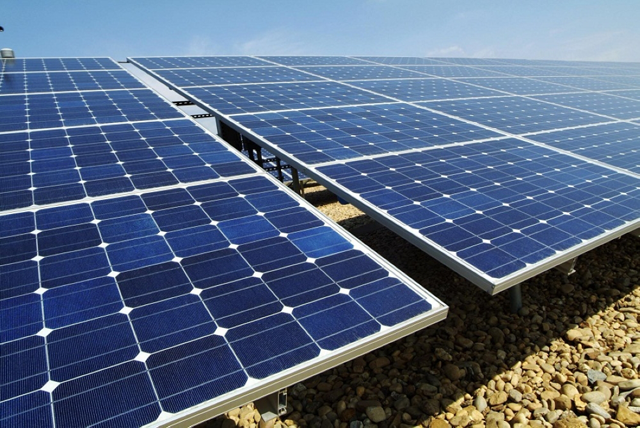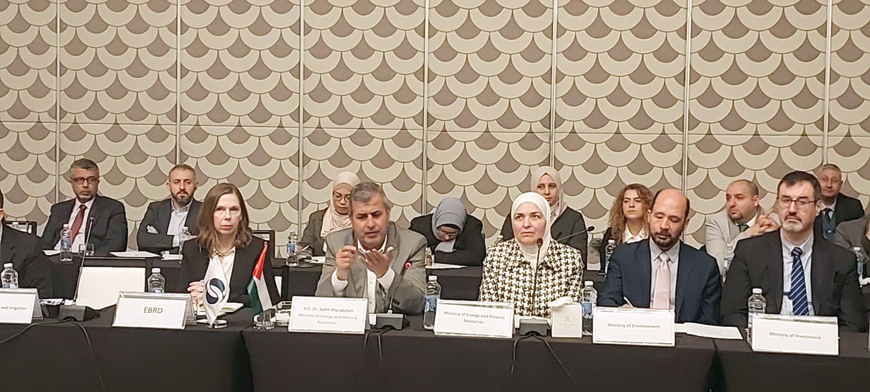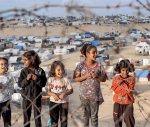You are here
Jordan secures top spot in renewable energy capacity, with potential to grow — Kharabsheh
By Rayya Al Muheisen - Sep 14,2023 - Last updated at Sep 14,2023
AMMAN — Jordan is making remarkable strides in the world of renewable energy, securing the top spot in the percentage of renewable energy capacity, excluding hydroelectric power, according to Minister of Energy and Mineral Resources Saleh Al Kharabsheh.
Kharabsheh announced on Tuesday that Jordan has the highest percentage of renewable energy capacity, citing the latest Arab Future Energy Index (AFEX) report, compiled by the Regional Centre for Renewable Energy and Energy Efficiency (RCREEE), as reported by the Jordan News Agency, Petra.
Kharabsheh underscored the Kingdom's unwavering commitment to ensuring a consistent supply of petroleum products, maintaining a 100 per cent rate.
“The contribution of renewable energy to the nation's electricity generation stood at 27 per cent during the past year,” Kharabsheh added.
The 2022 annual report of the Ministry of Energy reveals a shifting landscape in the energy mix. In 2021, electricity generation heavily depended on natural gas at 73 per cent, with renewable energy sources contributing only by 26 per cent. However, in 2022, natural gas' predominance dropped to 68 per cent, while renewable energy increased to 27 per cent.
Kharabsheh added that the total installed capacity for electricity generation from renewable sources stands at 2577 megawatts. Namely, 1498 megawatts originate from projects selling electricity to power companies, with wind energy contributing 614 megawatts and solar energy providing 884 megawatts.
Another 1079 megawatts are generated through renewable energy system projects owned by subscribers, said Kharabsheh.
Energy expert Hisham Aqel told The Jordan Times that by diversifying energy sources and embracing renewables, Jordan is reducing its carbon footprint and energy costs, and is paving the way for a more stable and secure energy future.
"Jordan's success in increasing its renewable energy capacity is a remarkable accomplishment,” Aqel added.
Aqel highlighted the difference between energy capacity and actual production: “There’s a difference between actual renewable energy production and the capacity to produce,” he said.
Aqel underscored the importance of renewable energy sources in light of global energy shortages. He said the renewable energy strategy stipulated Jordan would reach 50 per cent dependence on renewable energy sources by the year 2030.
“Shifting to renewable energy sources means reduced electricity generation bills enhanced Jordanians’ wellbeing and more environmentally friendly practices,” Aqel added.
The key challenge facing the transition is a lack of renewable energy storage facilities, he noted.
Solar energy has great potential in Jordan, since many parts of the country experience between 300 and 320 days of full sunshine throughout the year as the Kingdom also lies within the world’s solar belt.
Related Articles
AMMAN — Jordan's total capacity of installed renewable energy generation projects stood at 2,526 megawatts until the end of July, said Minis
AMMAN — Electricity supply across the Kingdom hit 99 per cent, thanks to the Ministry of Energy and Mineral Resources' strategic initiatives
AMMAN — The Ministry of Energy and Mineral Resources is working with partners to develop the optimal infrastructure for green hydrogen inves


















